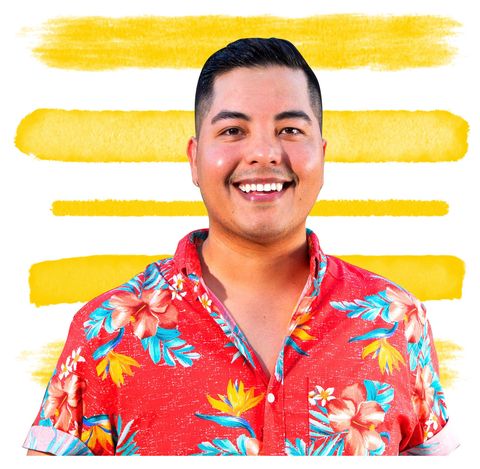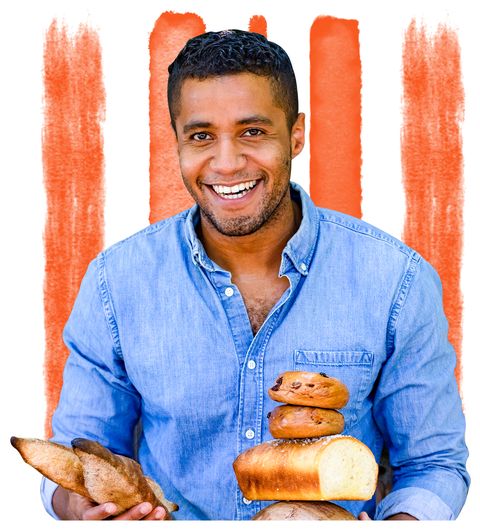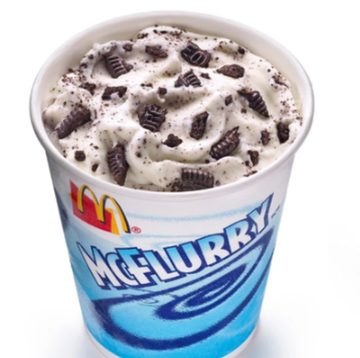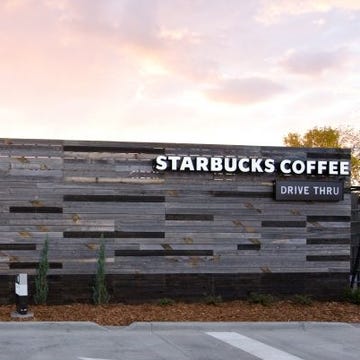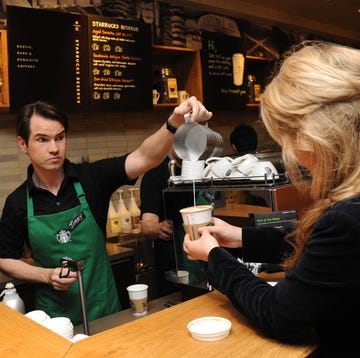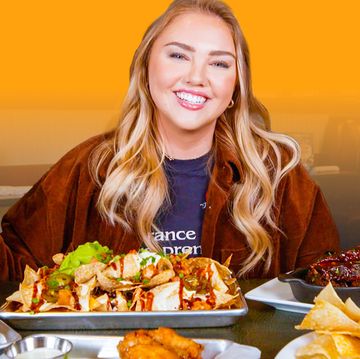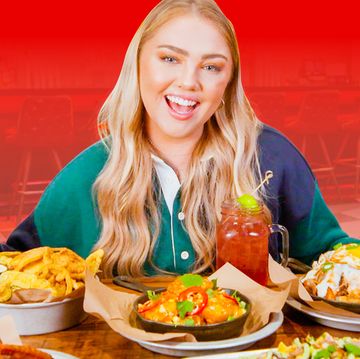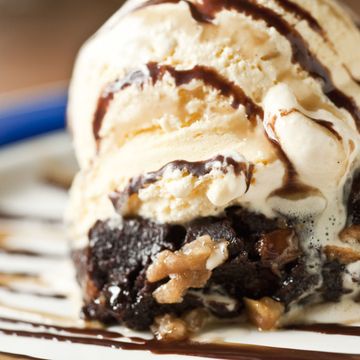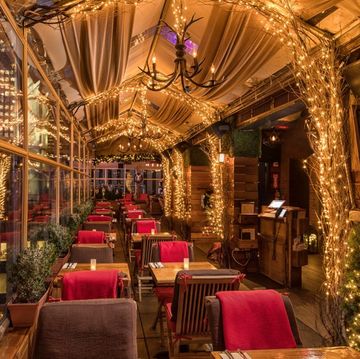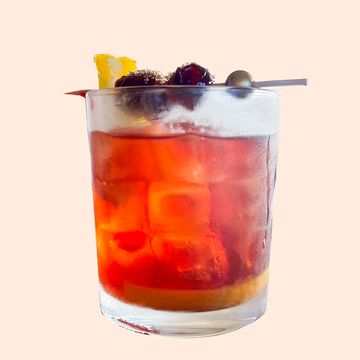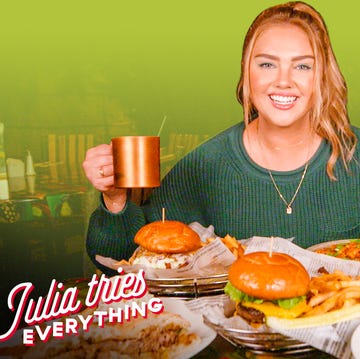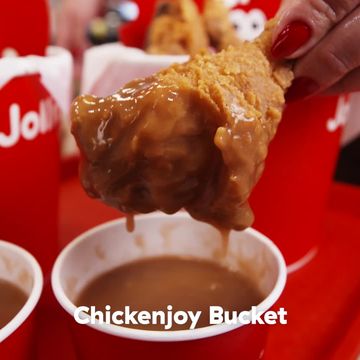This article part of The Power of Us, a series running across Hearst Magazines that celebrates the deep and profound ways that Hispanic and Latinx culture have shaped America. To see the complete portfolio, head here.
You can't talk about "American" food today without mentioning tacos. Fast food tacos, taqueria tacos, fancy tacos: tacos have become as ubiquitous and beloved as burger or pizza in this country. One in five people living in the United States eats at least one taco per day—our love for the handheld antojito skyrocketed 13 percent during Covid-19, claiming its spot as a top feel-good food—and there's a (legit) national holiday dedicated to the dish. But the real significance of the taco is the larger story it represents—the influence of the Hispanic and Latinx communities in the U.S.
Hispanic and Latinx culture shapes what we eat, crave, and experience every day: the endless variety of salsas at the supermarket; the neighborhood food trucks in cities big and small slinging empanadas, arepas, and birria; or the predominantly Hispanic and Latinx back-of-house staffs fueling our favorite restaurants.
In honor and celebration of the Latin food we love, Delish spoke to a handful of leading chefs, restauranteurs, and cookbook authors in the industry to discuss the power of their cuisine.
"People don't make peanut butter and jelly sandwiches anymore—they make quesadillas. Salsa outsells ketchup. Chipotle restaurant stock is worth a lot. And now people are asking for Mexican food from specific regions. That's the impact we've had on the country." —Bricia Lopez, co-owner of Guelaguetza in Los Angeles and author of Oaxaca: Home Cooking from the Heart of Mexico
"Mexican cuisine has popped up in every single corner of the United States—in corner shops, taco trucks, high-end restaurants, you name it. Tacos are the gateway to all the deliciousness of Mexican food—we all crave a good taco from time to time. Food is tradition, food is culture, with the tacos came an appreciation for the beautiful Mexican culture and traditions." —Gustavo Tosta, YouTube host of "Guga Foods"
"[It’s] incredible how Latin ingredients have become widely available: We don't have to put an asterisk next to ingredients in magazines anymore or direct people to a special section in the store to find tortillas. We've added flavor, color and history." —Marcela Valladolid, chef, cookbook author, and television host
“[People] are bringing certain tropical flavors to their cooking. People now like spicy and bold flavors. Beans and avocado are so popular—they’re in everything!” —Nelson German, executive chef and owner of alaMar Kitchen & Bar and Sobre Mesa in Oakland
"Latin cuisine has always been part of the food culture in the United States. As of 1836, Texas was still part of Mexico. Native Mexican ingredients greatly influenced the cuisine of what became Texas, along with some American contributions. Latin cuisine is often created with fresh, simple ingredients and you can see that influence in many restaurants in this country. Look at the elote and birria crazes. Food trucks are on every corner when it used to be just street food for immigrants." —Bryan Ford, author of New World Sourdough and host of "The Artisan’s Kitchen" on Magnolia Network
"I’ve seen more Latin restaurants (owned and led) open, and it feels like we’ve started to take control of our own narrative! I see a lot more non-white folks finally being praised for their passion and incredible talent." —Esteban Castillo, blogger and author of Chicano Eats: Recipes from My Mexican-American Kitchen
"Being around family. The first thing I learned to make was corn tortillas by my grandma when I was five or seven years old. There are no terrible cooks in Oaxaca. It taught me that family is everything." —BL
"Eating pizza in NYC when I was four. The first dish I learned to cook was Dominican Spaghetti, the kind you take to the beach. And I remember eating sandwiches with Wonder Bread, Dominican salami, and Dominican cheese. I didn't cook Dominican food until I opened alaMar. It's one thing I regret in my career and my life; I could have been cooking Dominican food a lot sooner. But, those memories led me to ask my mom and grandma more questions about Dominican food. The kind of Dominican salami I serve at alaMar is the same all-beef kind my mom would use." —NG
"Getting out of the hospital as a child, and my aunt, a chef, making an amazing Brazilian lasagna for me as a welcome home. I can still smell it. I can still taste it. It's not a traditional Italian lasagna—we use hams and different cheeses and spices. Now I make it for my kids in hopes that it becomes part of their memories as well." —GT
"Making egg-in-a-hole toast. It came from an American children's cookbook my mom bought for me when I was about seven or eight. It showed me that I was just as American as I was Mexican." —MV
"My mom making a quesadilla, which in Honduras is actually a sweet baked good typically served during the holidays. It made me realize how delicious the food from Honduras truly is. That has always stuck with me." —BF
"I’ve always been around food. My mom's side of the family earned their living by being passionate cooks and feeding others, and my grandpa was a sea salt miner who also ran a taco cart, so spending my summers as a kid with my grandparents really helped instill a curiosity and passion for food." —EC
"Birria. It’s what my family is known for!” —EC
"Chipotle Cream Spaghetti. It has nothing to do with tradition, but there are thousands of different versions in so many households throughout Mexico. When my mom was sick, a man named Pedro from Mérida came to cook for us and he would make this. To me, it was new and special, while the spicy chipotle flavors were still recognizable." —MV
"Baleadas [a flour tortilla filled with refried red beans, crema, and crumbled queso duro] is my favorite Honduran dish. My mom taught me how to make them and the process shaped me as a person. I learned a lot about patience and resilience." —BF
"Mole—it's complex and evolves into so many things like we do. Empanadas with Mole Amarillo or Mole Estofado that my mom made, which has almonds and olives." —BL
"Pollo Guisao, my favorite. It's the one dish I always ask my mom and grandma to cook for me. Sometimes they'll make it with a hen; bitter orange, soy sauce/maggi and sofrito. It's the dish that helps me feel the most connected to my culture and to my family." —NG
"I have to go with Picanha steaks. Picanha is a cut of meat that's little known in the U.S., but super popular in Brazil and South America. I'm big on steak." —GT
"The advancement of an entire community of color. It means a step into generational wealth, holding value for one another, creating wealth for our community, and keeping money in our community. Money is value; you value me, so you're paying me." —BL
"I get to see more recipes and stories developed by us and for us. White folks adding a squeeze of lime or sprig of cilantro to their dish and calling it 'Mexican' just doesn’t cut it anymore. I wrote my first cookbook with my younger self in mind. I wanted to see a book that catered to other Mexican-Americans who'd left home and missed their parents' cooking." —EC
"Highlighting different cultures. The best way to learn about someone's culture is through food. Food brings people together, sets the tone—it's everything. It can make people travel, it can make people happy. Someone who's racist will eat some other culture's food and might appreciate that culture more; it makes them more open-minded. It brings Mexico and the Dominican Republic to the United States for people who don’t want to travel to those countries." —NG
"It means everything; it means I have more Latin chefs to learn from and more amazing flavors to discover." —GT
"A better planet to inhabit. The effort that has been made by the media and publications to include diversity can sometimes feel disingenuous. Sometimes the pendulum has to swing in the wrong direction to make it right." —MV
"I have always wanted to propel our people forward, so it feels good to see more cookbook authors and restaurateurs of Latin descent. My mission is to create a new food culture where chefs of all backgrounds feel like they have space to thrive in environments in which they might not have felt comfortable before." —BF
"Not a particular celebration, but I do use the opportunity to bring awareness or to educate about the community at large. I'm celebrating yearround." —BL
"Hispanic Heritage Month is an everyday thing for me; I embrace and celebrate my identity every day." —EC
"Of course! This year I decided to learn more about our people's history. I'm reading lots of different books to help give me context for some of the history components of my second cookbook."
—BF
"It's Hispanic Heritage Month every day of the year for me." —MV
"No, it's Hispanic Heritage month every day for us being here. This is our life." —NG
"Living in Miami is Hispanic Heritage Month every day! I can connect with my Latin culture, and I have also embraced the Hispanic culture. I would celebrate with rice, beans, picanha, croquetas, tostones, and more." —GT
"Food reminds me of being with family and sharing a meal. It reminds me of holidays—those were a big thing—with pernil and braised oxtails (my mom would only make those for special occasions). Our cultural foods make us feel connected to our family. Family is everything." —NG
"A sense of belonging and community are deep rooted in food. I moved to Los Angeles when I was ten years old. Food reminds me of family and memories of where I come from. It's in my blood and soul. It's family legacy and family is everything." —BL
"Food is so closely tied to my history and the history of my family. All of the memories I have are wrapped around food and my grandfather’s house in Tijuana where there were magnificent feasts. We fully embraced both Mexican and American holidays: Dia de Los Muertos and Halloween." —MV
"How unique it is. 'Ethnic' cuisine is making folks in the U.S. learn about their origins, and the importance that certain dishes and ingredients have to those respective cultures. Food is no longer just that in the U.S.—it's an extension of a community and culture. —EC
"I'm happiest when I get to cook the amazing Brazilian food I grew up with. When I first came to this country I missed the food terribly, so I found ways to replicate my childhood favorites and stay connected to my roots."—GT
"Food is a way for me to bring people together, and in our culture family and togetherness are very important; food is a huge part of that." —BF
Video by Chelsea Lupkin
Illustrations by Celina Pereira

Illyanna is the first Puerto Rican food columnist in the country. She’s a food writer and a classically-trained cook that highlights the gastronomy of the Puerto Rican diaspora. Her work has been featured in Bon Appetit, Food & Wine, Saveur, Eating Well, Food 52, SF Chronicle and The Takeaway podcast. She is currently working on her debut cookbook, "Diasporican," from her home in Northern California.



